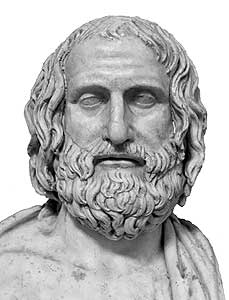
According to The Oxford Classical Dictionary, Euripides was born circa 480 B.C., dying sometime between 407 and 406. He was a central figure in the City Dionysia, an annual theater celebration honoring the God Dionysus in the Theater of Dionysus in Athens. He was one of the most prolific playwrights, writing “some ninety plays” though only the following have survived (“Euripides” 571):
- · Alcestis
- · Medea
- · Hippolytus
- · Andromache
- · Hecuba
- · Trojan Women
- · Phoenissae
- · Orestes
- · Bacchae
- · Rhesus
- · Helen
- · Electra
- · Heraclidae
- · Heracles
- · Suppliant Women
- · Iphigenia at Aulis
- · Iphigenia among the Taurians
- · Ion
- · Cyclops
In terms of the amount of plays that have survived, “we have more than twice as many of them as we have plays by either Aeschylus or Sophocles,” providing scholars with a uniquely large body of work (571).
Euripides lived “during the Peloponnesian War,” and as a result, several of his plays contain anti-war themes (Klaus 77-6). His plays also contain complex situations relating to gender, especially in Bacchae and Medea. However, Euripides was not very popular during his lifetime; he was criticized because “his view of experience was too harsh, his means of expression too unconventional, for the tastes of his audience,” and, despite the amount of plays he wrote, “he won the festival competition only four times” (77). He is often described as a realist in terms of his depictions of people; in fact, “Sophocles is reported to have said that Euripides shows human behavior not as it ought to be but as it is” (77). Likewise, Euripides is often given credit for creating the “tragicomedy” genre—a genre often referred to as dark comedy (78).
Aristotle criticized Euripides "for using...sensational episodes, episodic plots, elaborately rhetorical debates, irrelevant choral odes, supernatural events, and melodramatic scenes" (Klaus 78). However, he also held Euripides in great esteem, claiming that he was “the most tragic of the poets” (Poetics 18). Likewise, he compares Euripides to Aeschylus, claiming that though, at a certain point, they “each composed the same iambic line…the alteration of a single word by Euripides, who employed the rarer term instead of the ordinary one, makes one verse appear beautiful and the other trivial” (Poetics 31). Aristotle also draws attention to Euripides around seven times in On Rhetoric, using both the man and his work as examples. For instance, in chapter 6 of book II, the discussion of shame and shamelessness, Aristotle claims that Euripides used the topic, “they feel shame [in refusing] those who have asked for something for the first time, since they have not yet been held in disrespect” when he, as an “Athenian ambassador to Syracuse in Sicily” (see the footnotes on page 147 of On Rhetoric), asserted how shameful the Syracusian decision to reject the Athenian request for aid was considering their newly established connection (Rhetoric 147). As evidenced by his repeated references to him in both The Poetics, and On Rhetoric, Aristotle obviously viewed Euripides as a successful playwright and statesman.
References
Aristotle. On Rhetoric. Trans. George A. Kennedy. New York: Oxford U. P., 1991.
--The Poetics. Trans. S. H. Butcher. A Penn State Electronic Classics Series Publication, 2000.
"Euripides." The Oxford Classical Dictionary: The Ultimate Reference Work on the Classical World. Simon Hornblower and Antony Spawforth. 3rd. New York: Oxford U. P. , 1996.
Print.
Klaus, Carl H., Miriam Gilbert, and Bradford S. Field Jr. "Euripides." Stages of Drama: Classical to Contemporary Theater. 5th. Boston: Bedford, 2003. 77-9. Print.